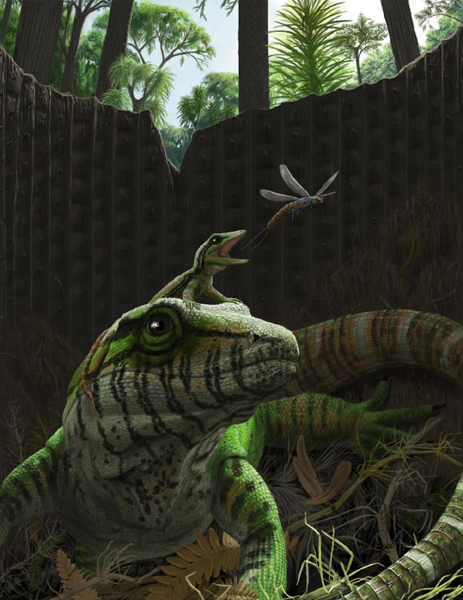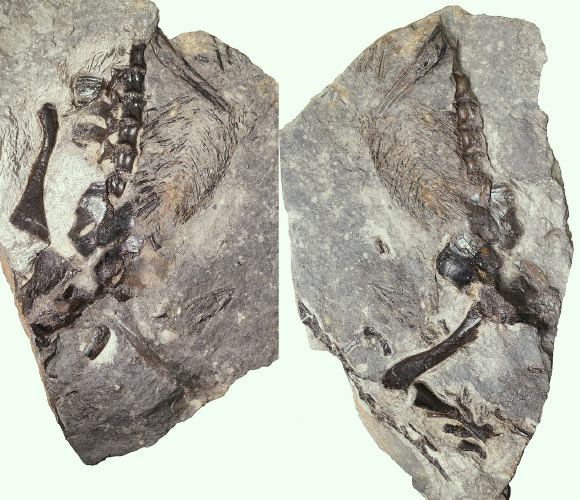New Research Highlights Carboniferous Parental Care
Carboniferous Fossil Provides Evidence of Parental Care
Parental care is a common behaviour amongst mammals, the chances of the offspring surviving are enhanced by the parents making an investment in looking after their young, but when did this behavioural strategy evolve in the ancestors of the Mammalia? This is a tricky question to answer as evidence for such behaviours is rarely preserved in the fossil record, but a remarkable discovery inside a lithified tree stump dating from around 305 million years ago from Cape Breton Island, Nova Scotia (Canada), may have provided palaeontologists with a fresh insight into prehistoric parenting.
Dendromaia unamakiensis
A team of scientists writing in the academic journal “Nature Ecology & Evolution” report the discovery of fossilised remains of an adult lizard-like creature in association with a very young member of the same species preserved within the tree stump. Finding an adult and associated conspecific juvenile has been interpreted as evidence of the parent staying close to its offspring and therefore a demonstration of parental care.
The creatures are members of the Varanopidae family, so called as these creatures resemble extant monitor lizards (Varanus), but they are not closely related to monitor lizards and are a new genus. They have been named Dendromaia unamakiensis and if this is prehistoric parental care, then it predates the previous earliest evidence by some forty million years.
Evidence of Parental Care in a Synapsid (Dendromaia unamakiensis)
Picture credit: Henry Sharpe
A Varanopid (Synapsid) Caring for its Young
The Varanopidae are geographically widespread and temporally diverse. Most of these animals were around 1 metre in length, much of their body length was made up of their long tails. They evolved during the Carboniferous and persisted into the Middle Permian. Varanopids are regarded as one of the most successful of the early types of amniotes, however, whether they are ancestral to modern mammals and members of the Synapsida or whether they are actually diapsids is an area of debate amongst palaeontologists.
Commenting on the significance of the fossil discovery, lead author of the scientific paper Professor Hillary Maddin (Carleton University, Ottawa, Canada), commented:
“Parental care is a behavioural strategy where parents make an investment or divert resources from themselves to increase the health and chances of survival for their offspring. While there are a variety of parental care strategies, prolonged postnatal care is amongst the most costly to a parent. This form of parental care is particularly common in mammals, as all mammalian offspring demand nourishment from their mothers.”
The Slab and Counter Slab with the Preserved Remains of the D. unamakiensis Fossils
Picture credit: Maddin et al
The researchers concluded that this was evidence of parental care as the preservation of delicate details and structures in the fossils indicate a rapid burial with little movement after death. The adult and the juvenile were close to each other at the time that they died. The location of the young animal beneath the hindlimb and encircled tail of the adult resembles a position associated with animals living in a den.
Earliest Evidence of Prolonged Parental Care
The fossils could represent the earliest known record of prolonged parental care. Prior to this discovery, the previous earliest record of this sort of parental behaviour was identified in a varanopid from the Middle Permian of South Africa. A scientific paper was published in 2007, describing the discovery of five articulated conspecific varanopid specimens, one of which was much larger than the others. This was interpreted as an adult and four juveniles, a family group with the older animal looking after its offspring.
Whether Dendromaia is a synapsid of diapsid might be debatable, but whatever the taxonomic relationship to other more advanced amniotes, this fossil discovery suggests that parental care is deeply rooted within the Amniota clade and that parenting behaviour might have been more widespread amongst Palaeozoic tetrapods than previously thought.
The scientific paper: “Varanopid from the Carboniferous of Nova Scotia reveals evidence of parental care in amniotes” by Hillary C. Maddin, Arjan Mann and Brian Hebert published in the journal Nature Ecology & Evolution.
The Everything Dinosaur website: Everything Dinosaur.



